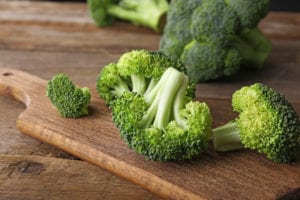Written by Chrystal Moulton, Staff Writer. Glucoraphanin enriched broccoli soup suppressed gene expression pathways linked to prostate cancer.
 Prostate specific antigen testing (PSA) has increased the ability to detect prostate cancer. Men with organ-confined prostate cancer can choose conventional treatment or an active surveillance program to delay chemotherapy until evidence of cancer progression is found 1. However, no approved treatments for men in the active surveillance program exists that could reduce the risk of cancer progression. Up to 40% of cases detected through PSA testing show clinical progression 2,3. Some epidemiological studies demonstrated a negative association between consumption of cruciferous vegetables and incidents and progression of prostate cancer 4. Glucosinolates found in cruciferous vegetables exhibits biological activity that could have protective effects against prostate cancer. However no human studies exist to date showing such protective effects of glucosinolates 5.
Prostate specific antigen testing (PSA) has increased the ability to detect prostate cancer. Men with organ-confined prostate cancer can choose conventional treatment or an active surveillance program to delay chemotherapy until evidence of cancer progression is found 1. However, no approved treatments for men in the active surveillance program exists that could reduce the risk of cancer progression. Up to 40% of cases detected through PSA testing show clinical progression 2,3. Some epidemiological studies demonstrated a negative association between consumption of cruciferous vegetables and incidents and progression of prostate cancer 4. Glucosinolates found in cruciferous vegetables exhibits biological activity that could have protective effects against prostate cancer. However no human studies exist to date showing such protective effects of glucosinolates 5.
In the current double blind randomized controlled trial 1, researchers tested the effect of a diet rich in glucoraphanin (a sulforaphane found in cruciferous vegetables) on gene and metabolite expression in men on active surveillance for prostate cancer. Sixty-one patients (18-80yrs old) with low or intermediate risk prostate cancer were randomly assigned to one of three dietary arms:
- Broccoli Soup X (control) – 72 ±8 µmol glucoraphanin
- Broccoli Soup Y (treatment) – 214 ±3 µmol glucoraphanin
- Broccoli Soup Z (treatment) – 492 ±2 µmol glucoraphanin
Patients were required to consume 300 mL of broccoli soup per week as part of their normal diet for 12 months. All patients underwent transperineal template biopsy at the start of the intervention and after 12 months. Biopsy cores obtained at baseline and at 12 months were analyzed for histopathology, gene expression, and metabolomic analysis. Biomarkers of liver and kidney function were also assessed to ensure no toxic effects over the broccoli soup treatments.
At baseline no differences were observed in dietary habits among the volunteers in either of the three dietary arms. No difference in dietary habit was observed at 12 months apart from the broccoli soup treatments. Forty-nine patients completed the trial. Due to low number of patients completing the trial, assessment of clinical endpoints of prostate cancer progression could not be evaluated. However, an overall inverse correlation between dietary intake of broccoli soup and prostate cancer progression was observed at baseline and at 12months. Significant changes in gene expression were observed in the control group. Gene sequence expression analysis revealed that pathways associated with risk of carcinogenesis (P < 0.05), inflammatory response (P < 0.05), androgen response (P < 0.001), angiogenesis (P < 0.001), apoptosis (P < 0.002), and epithelial- mesenchymal transition (P < 0.05) were increased in the control group. Patients who consumed soup Z with the highest amount of glucoraphanin saw a change in only one gene expression and changes in oncological gene expression pathways were attenuated. Researchers also observed increase of downregulated genes for reactive oxygen species and xenobiotic metabolism pathways in soup Z dietary arm. Moderate changes were observed among those who consumed soup Y.
Although not sufficiently powered to demonstrate clinical endpoints of prostate cancer at 12 months, the enriched broccoli soup treatment was inversely correlated with expression of genes linked to progression of prostate cancer. More studies will be needed to determine the protective effects of glucoraphanin enriched broccoli soup on men with prostate cancer.
Source: Traka, Maria H., Antonietta Melchini, Jack Coode-Bate, Omar Al Kadhi, Shikha Saha, Marianne Defernez, Perla Troncoso-Rey et al. “Transcriptional changes in prostate of men on active surveillance after a 12-mo glucoraphanin-rich broccoli intervention—results from the Effect of Sulforaphane on prostate CAncer PrEvention (ESCAPE) randomized controlled trial.” The American journal of clinical nutrition 109, no. 4 (2019): 1133-1144.
© American Society for Nutrition 2019. All rights reserved. This is an Open Access article distributed under the terms of the Creative Commons Attribution License (http://creativecommons.org/licenses/by/4.0/)
Click here to read the full text study.
Posted May 17, 2021.
Chrystal Moulton BA, PMP, is a 2008 graduate of the University of Illinois at Chicago. She graduated with a bachelor’s in psychology with a focus on premedical studies and is a licensed project manager. She currently resides in Indianapolis, IN.
References:
- Traka MH, Melchini A, Coode-Bate J, et al. Transcriptional changes in prostate of men on active surveillance after a 12-mo glucoraphanin-rich broccoli intervention-results from the Effect of Sulforaphane on prostate CAncer PrEvention (ESCAPE) randomized controlled trial. Am J Clin Nutr. 2019;109(4):1133-1144.
- Iremashvili V, Soloway MS, Rosenberg DL, Manoharan M. Clinical and demographic characteristics associated with prostate cancer progression in patients on active surveillance. J Urol. 2012;187(5):1594-1599.
- Fleshner NE, Lucia MS, Egerdie B, et al. Dutasteride in localised prostate cancer management: the REDEEM randomised, double-blind, placebo-controlled trial. Lancet. 2012;379(9821):1103-1111.
- Richman EL, Carroll PR, Chan JM. Vegetable and fruit intake after diagnosis and risk of prostate cancer progression. Int J Cancer. 2012;131(1):201-210.
- Juge N, Mithen RF, Traka M. Molecular basis for chemoprevention by sulforaphane: a comprehensive review. Cellular and molecular life sciences : CMLS. 2007;64(9):1105-1127.
